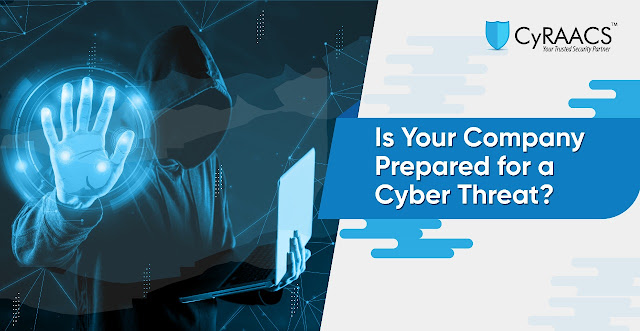Is Your Company Prepared for a Cyber Threat?
Cybercriminals are constantly finding new ways to breach our online data, from social engineering to DDOS attacks. And for companies of all sizes, not only is their personal data at risk but so is their business. In fact, half of all cyber-attacks happen to small and medium-sized businesses.
It's more important than ever to take extra steps to secure
your online privacy and prevent any criminals from gaining access to your
personal information. Protecting your privacy is simpler than you think. To
start, make sure every employee is using a strong password. You can also employ
password apps such as LastPass, which securely stores passwords and generates
random ones across devices. You should also make sure employees are changing
their passwords regularly and using a two-factor authentication login. By
taking these simple precautions, you can help safeguard your online privacy and
protect yourself from potential identity theft.
Is your company prepared for a cyber-attack? These are questions that you should be asking yourself and your team members.
Q- Does your every employee use a strong password?
No, more than half of all data breaches are caused by weak
passwords. Only a very small number of companies have a strict policy on
password security, though, leaving themselves vulnerable to attack.
Ask your employees to use strong passwords, and to also use
password managers. Password managers store passwords and generate random ones
across devices, which helps to keep your company's information more secure.
Q- How do you manage employee passwords? Are your employees change their passwords regularly?
No, although a password policy can help to reduce the risk
of hackers gaining access to business information, most businesses do not
enforce such a policy. This leaves them vulnerable to attack.
It's important to reset passwords monthly to ensure that all
staff members are changing their passwords regularly. This helps to keep your
company's information secure and prevent unauthorized access.
Q- When would you implement two step authentication as part of your process?
Two-factor authentication adds an extra layer of security to
your password protection, making it more difficult for hackers to breached your
account.
Enable two-factor authentication for all of your accounts
whenever possible - this way you can ensure better security for yourself. This
is especially important when it comes to your email accounts as they are often
the gateway to other accounts that you have.
Q- Employees Working On Their Personal Devices?
No, all devices connected to the company network can be a
potential security threat, with smartphones being some of the easiest targets.
According to Nokia, malware infections on smartphones rose by 400% in 2016.
As an employer, you can help keep your employees' work
phones secure by giving them phones with a pass code and installing a security
app that can remotely wipe the phone if necessary.
Q- Are You Backing up your files?
No, ransomware can make your files completely inaccessible.
The only way to prevent losing access to your important files is by keeping
offsite backups.
Having a system in place that saves your data in multiple
locations is key to protecting against data loss in the event of an attack.
Local backups on an offsite server are essential to ensure you don't lose
access to your data.
Q- Does every company device have installed malware and antivirus?
No, most cyber-attacks can be prevented by setting the
basics, like having proper and regularly updated security software.
Use updated antivirus & malware software on every
device. Check devices like flash drives before use.
Q- Have you taken measures to limit the number of employees with admin access to only those who absolutely need it?
No, restricting the admin privileges is one of the most
important aspects of cyber security.
Educate your employees on best cyber security practices and
give admin access to those who need it.
Q- Are your employees aware of phishing emails?
Phishing emails are the most common
type of attack businesses face, making up 50% of all attacks.
Phishing emails can be difficult
to identify because they often look real. It's important to educate your
employees on how to spot a phishing email, and to make sure they know not to
click on any links or share sensitive information before clearing it with the
sender.
Q- Do you encrypt your databases and your customer information?
No, if your database is not
encrypted, your sensitive information will be accessible in the event of an
attack.
Making sure all important data is
encrypted is crucial. For Windows PC's, Bit locker is a great option. For Macs,
Apple File Vault is a good choice.
Q- Do you protect your Websites or apps properly?
No, more than 75% of websites
scanned contain vulnerabilities, like outdated operating systems, plugins, etc.
Most attack happens on WP websites. Stay
updated on WP security best practices, keep backups, install updates and be
aware of dodgy plugins.
Conclusion:
At cyraacs, we understand that companies in Bangalore, India have a lot to worry about when it comes to cybersecurity. We want to help you secure your data and your customers' data so that you can focus on running your business. We offer comprehensive cyber risk advisory Services that are tailored to your specific needs. Contact us today to learn more about how we can help you protect your business.




Comments
Post a Comment